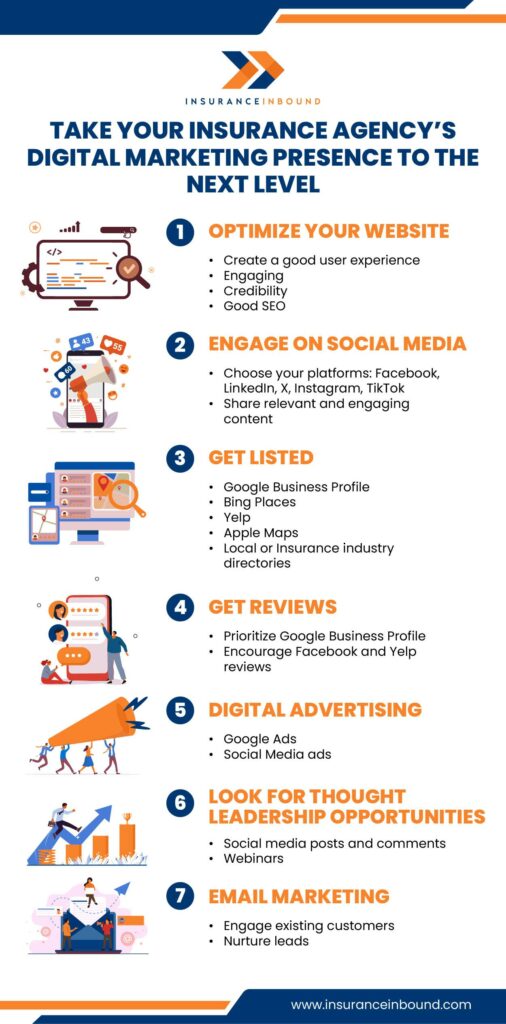There are many things to consider when trying to build your small, local insurance agency. It can seem hard to compete with the buy guys whose insurance marketing consists of memorable TV commercials with catchy songs that borrow beats from old favorites. Maybe television ads aren’t in your budget, but you can still gain market share and increase consumer insurance clients by developing and building your agency’s digital presence. Whether you’re already developing a digital presence or not sure where to start, here are some ways you can take your insurance agency’s digital presence to the next level.

Optimize Your Website
If you want to grow your insurance business through digital marketing efforts and capture more internet leads, the first thing you’ll need to do is optimize your website. Your other digital efforts are pointless if you don’t have a good website with a good user experience.
What makes a good website user experience?
Sleek and easy navigation – Users should be able to easily find what they are looking for and get from one page to the next. If you make it difficult for them to find information about a particular service or how to contact you, you are more likely to lose them.
Engaging and educational content – A good library of resources can help keep visitors on your site. It can help them feel empowered to make informed decisions about the type of coverage you offer and what they need. Blogs, infographics, and videos can engage users and aid in their decision-making. You can even leverage these for your digital marketing efforts. If you want to take your site to the next level, consider a premium calculator so customers can determine what their monthly premiums would be for various plans.
Establish Credibility – Insurance is a very regulated industry. There’s no doubt your agency and your brokers or agents have some level of certification. Display those certifications on your website. Agency certifications should go on your website footer. Have a biography page for each agent or broker highlighting their accolades and credentials.
Good SEO – Just as important as having great content, is making sure your great content is found. Developing a Search Engine Optimization (SEO) strategy for your insurance agency with the right keywords, headlines, and meta content can increase your likelihood of being found on search engines.
Engage On Social Media
Establishing a robust social media presence for your insurance agency is another key strategy to enhance your digital presence. You may wonder if you need to be on every social media platform. Not every platform may be best for your agency. Evaluate your target market and determine the best social channels to reach them.
Start with the basics: Facebook and LinkedIn. These may be the two biggest channels for establishing creditability as a legitimate and reliable business.
Create and build out a Facebook page for your local agency. Post regularly. This is a great opportunity to share your blog posts, videos, and other updates and announcements about upcoming events or promotions. Keep a good balance of content related to your business and other useful information such as industry updates and posts from other thought leaders. Showcase your agents and brokers. Posts with real employees get the most engagement.
Build out LinkedIn the way you would Facebook. Encourage your agents and brokers to have profiles and connect them with your agency’s page and share your page’s content.
Engage in the community aspect on Facebook and LinkedIn. Join local or insurance-related groups. Like and comment on other member’s posts, when relevant. Ask questions and share your thoughts.
If you host educational events, whether online or at a physical location, utilize Facebook and LinkedIn to promote those events, and interact with interested parties.
X (formerly known as Twitter) is often a professional service industry organization’s next preferred social media platform. You can post the same content as you would on Facebook and LinkedIn (with some character limitations). With this platform it’s very easy to search industry trends (via hashtags) and like, comment on, or repost articles.
Instagram once seemed like a “nice to have” for service-related companies, but now it’s become a must-have. This is a great platform to share your videos, staff photos, event photos, and other relevant graphics. Use images to build out your brand and tell app users what your agency is about. Once you have an Instagram account you can easily create a Threads account, which is Meta’s answer to X.
TikTok is the fast-growing social media platform. Once thought of as a platform for younger users, about a quarter of its users are between 25 – 44. This can be a prime market for any type of insurance product; auto insurance, life insurance, health insurance. Using TikTok for educational or engaging videos can help you reach a portion of your target market who might not be actively searching the web.
Get Listed
Not only do you want to be found on a website search, but you also want to be on the map! (Literally) And Google Places in Google Maps can also show up as a search result, increasing your visibility above the competition.
The most important places for local listings include:
Google Business Profile – Building out your Google Business profile can help increase your search visibility. It also helps visitors locate your business via Google Maps. Even if you haven’t created a profile already, there might be one out there, so be sure to claim it. For a better digital presence, build out your profile with a description of your business, contact information, and your hours. Take it to the next level by adding posts (can be recent blogs, upcoming events, or anything else you want to promote). You can even add products or services with stock photos or icons. Don’t forget to upload photos of your business. At the minimum, add a photo of the outside of your business and the lobby. Make it more engaging by adding photos of staff or business events. If you have more than one office, create a separate profile for each location.
Bing Places – Similar to Google, you can create a profile with a map to reach Bing users. This site doesn’t have as many options as Google, but you can upload photos and add your contact information and hours.
Yelp – This is another important one. Chances are, even if you haven’t already created a profile, there may be a review of your business on Yelp. Create or claim your profile so you can manage your reputation and handle any negative feedback accordingly. Here you can also add images and limited business information. But it’s a great opportunity for a backlink.
Other Listing Opportunities
Apple – Not quite as important as Google, but an Apple Business listing makes it easier for Apple map users to find you.
Directories – Research local or regional directories, such as Bucks County Alive, or professional directories like Merchant Circle, or insurance industry directories, such as Insurance Guide or My New Markets.
Get Reviews
Reviews establish credibility. They can make or break someone’s decision to contact your agency. Encourage customers to leave an online review of your business on Google, Yelp, or Facebook. (Google is the most important)
More reviews on Google means a more complete profile, which makes your business profile more likely to show up as a relevant search result. Consider using email marketing automation or a reputation management tool to help you solicit reviews.
Aside from external reviews, consider adding testimonials to your website visitors who bypass the other sites and can see what your customers have to say.
Digital Advertising
Digital advertising, like traditional advertising, can help you grow your business, but it can also help you measure results.
You can use Google Analytics to track how many people filled out a form, completed an application, called your office, or took other engaging actions, and from which platform.
The most commonly, and perhaps easiest to use is Google Ads. Set a budget that you are comfortable with (We suggest at least $1,000) and create text ads for those searching for your products and services, or display ads to reach potential customers as they browse the web. Use remarketing to lure back website visitors who didn’t take a particular action.
You can easily upload your Google campaigns into Microsoft’s Advertising (Bing). The interface is different, but you can perform the same basic functions.
Facebook Ads – Appeal to Facebook users as they scroll through their feeds. Your Facebook ads will also show up on Instagram. You can use Facebook to target a local audience on Facebook, or you can target website visitors. Through Facebook advertising, you can create ads or you can sponsor an organic post for an inexpensive way to increase your reach.
LinkedIn Ads – LinkedIn ads work best for B2B advertising if you’re targeting a commercial client. You can target people based on their job titles, such as HR or benefits administrators. You can also target people who work in insurance industries or belong to related groups.
TikTok – As with the other social media platforms, you can also run ads on TikTok, whether or not you’re actively posting videos.
NextDoor – This platform doesn’t have as fluid a budget as Search or Social Media ads and can be more expensive, but it is another option to engage with potential customers on a local level.
Look for Thought Leadership Opportunities
Do more than just comment on social media posts and share relevant and useful information. Take your thought leadership to the next level by hosting webinars. Promote your webinar on social media. This is a great way to build your brand through awareness and an opportunity to follow up with interested parties later.
Don’t forget the good old-fashioned guest post article. Encourage one of your agents to write an article or blog for an insurance-related publication. It will help you gain credibility and get some backlinks to your site to build your SEO.
Email Marketing
Remember those email addresses you collected from your webinar? You now have an email marketing list. Aside from sending contacts the webinar playback, send them something useful two weeks later. It could be something related to the webinar, or maybe ask the contacts to follow you on social media to learn about more webinars. Engage them even more by sending a survey about the webinar or a poll asking what they would like covered in the next webinar.
Email marketing is also a great way to engage existing customers and cross-promote other projects, and nurture prospects. Not sure how to get prospects? Consider offering a useful whitepaper on your website in exchange for an email address.
Partner with an Experienced Digital Marketing Agency That Understands Insurance
Ready to take your insurance marketing to the next level? Put your trust in an experienced digital marketing agency that understands insurance. InsuranceInbound understands the needs of businesses in regulated industries like Insurance. Explore our digital marketing offerings or contact us today to learn how we can help you grow your insurance business.
